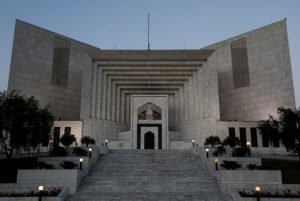Supreme Court case postponed indefinitely
Due to the illness of one of the eight judges, the hearing had to be postponed.

The petitions against the Supreme Court (Practice and Procedure) Act, 2023, which aims to limit the powers of the chief justice of Pakistan (CJP), have been postponed indefinitely by the supreme court in ISLAMABAD.
The eight-judge panel considering the case was scheduled to continue on Thursday. According to the court’s officials, however, it was unable to hold the hearing because Justice Shahid Waheed, a bench member, was ill.
Justices Ijazul Ahsan, Muneeb Akhtar, Mazahar Ali Akbar Naqvi, Muhammad Ali Mazhar, Ayesha Malik, Hasan Azhar Rizvi, and Shahid Waheed serve on the bigger bench presided over by CJP Umar Ata Bandial.
The Chief Justice of Pakistan (CJP) planned to meet with Attorney General for Pakistan (AGP) Mansoor Awan and other counsels on Thursday, according to a court staffer.
During their meeting, the AGP explained to the chief justice that the government had been trying to integrate the Supreme Court (Practice and Procedure) Act, 2023 and the Supreme Court (Review of Judgements and Orders) Act, 2023 but had been unsuccessful.
He explained that the budget session of parliament is currently underway, making it impossible for the administration to draft legislation to harmonize the two statutes at this time. He asked the CJP to schedule a hearing on the lawsuit after Congress passed a new federal budget.
On June 1st, during the most recent court session, AGP Mansoor Awan confessed
Both the Supreme Court (Practice and Procedure) Bill, 2023 and the Supreme Court (Review of Judgments and Orders) Bill, 2023 have some overlapping provisions.
According to the AGP, “the sections dealing with filing of review petitions and hiring counsels are somewhat similar in both law,” but the Supreme Court (Practice and Procedure) Act, 2023 covers more ground because it addresses the inner workings of the SC.
The AGP also noted the importance of deciding “which law should be relied upon.”
Although the CJP appreciated the statement from the state’s chief legal officer, he or she pointed out that the administration should have notified the Supreme Court before passing any legislation affecting the court’s operations.
“The judiciary is not an area that should be subject to arbitrary regulation. He has previously remarked that before passing laws affecting the internal administrative operations of the court, the government should have consulted with the Supreme Court.
The CJP’s ability to take suo motu action and to create benches was limited by the passage of the Supreme Court (Practice and Procedure) Bill 2023 by the National Assembly on March 29. On March 30, the Senate gave the bill its approval.
However, the president sent the law back to the legislature without signing it. On April 13, the Supreme Court’s enlarged bench of eight judges “pre-emptively” halted enforcement of the bill while hearing several petitions challenging it.
Nonetheless, the bill was signed into law on April 21st, against the directive of the highest court.









































